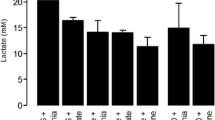Abstract
To clarify glucose metabolism in a hydrocephalic rat brain, substances related to glycolytic metabolism were biochemically measured. Kaolin-induced hydrocephalic rats were sacrificed and lactate dehydrogenase (LDH), LDH isozyme, lactate, adenosine triphosphate (ATP), and isocitrate dehydrogenase (ICDH) were measured in the following regions: cortex, thalamus, midbrain, hippocampus, cerebellum, and pons with medulla. During the development of hydrocephalus, lactate and LDH increased in most regions, the LDH M-subunit increased in the cortex, and ICDH decreased in most regions. However, ATP levels did not change. The increases in lactate, LDH and M-subunit suggested an anaerobic environment in the cell leading to activation of the anaerobic glycolysis. The decrease in ICDH represented a diminution of the tricarboxylic acid cycle. Through these alterations, the ATP level can be kept constant during the course of hydrocephalus, allowing the brain to create a better biochemical milieu.
Similar content being viewed by others
Author information
Authors and Affiliations
Additional information
Received: 22 March 1996 Revised: 2 November 1996
Rights and permissions
About this article
Cite this article
Hidaka, M., Matsumae, M., Yamamura, M. et al. Glucose metabolism and protective biochemical mechanisms in a rat brain affected by kaolin-induced hydrocephalus. Child's Nerv Syst 13, 183–188 (1997). https://doi.org/10.1007/s003810050066
Issue Date:
DOI: https://doi.org/10.1007/s003810050066



